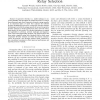Free Online Productivity Tools
i2Speak
i2Symbol
i2OCR
iTex2Img
iWeb2Print
iWeb2Shot
i2Type
iPdf2Split
iPdf2Merge
i2Bopomofo
i2Arabic
i2Style
i2Image
i2PDF
iLatex2Rtf
Sci2ools
104
click to vote
GLOBECOM
2008
IEEE
2008
IEEE
Outage Behavior of Cooperative Diversity with Relay Selection
Abstract—Cooperative diversity is a useful technique to increase reliability and throughput of wireless networks. To analyze the performance gain from cooperative diversity, outage capacity is an important figure of merit that captures the inherent diversity-multiplexing trade-off in cooperative diversity schemes. In this paper we derive the outage capacity for several cooperative diversity schemes in decode-and-forward relay networks with a finite number of relay nodes. The obtained expressions are simple and applicable to arbitrary network topologies and signal-tonoise ratios in Rayleigh fading channels. The analysis shows that there exists a signal-to-noise ratio threshold, below which some cooperative diversity schemes are better than direct communication. We propose a new diversity scheme, which, compared to the conventional counterpart, offers improved performance and requires protocol overhead.
Abstract—Cooperative Diversity | Communications | Cooperative Diversity Schemes | GLOBECOM 2008 | Outage Capacity |
Related Content
| Added | 09 Nov 2010 |
| Updated | 09 Nov 2010 |
| Type | Conference |
| Year | 2008 |
| Where | GLOBECOM |
| Authors | Kampol Woradit, Tony Q. S. Quek, Watcharapan Suwansantisuk, Henk Wymeersch, Lunchakorn Wuttisittikulkij, Moe Z. Win |
Comments (0)

